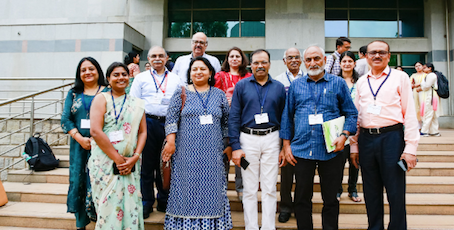Rare Genetic Diseases Research Summit Calls for Collaboration to Conquer Challenges
March 06, 2024 | Wednesday | Features | By Saveetha Meganathan, Shweata Hegde, Surabhi Srivastava
Need to improve diagnostics, therapeutics, and overall care for RGD patients in India
The Rare Genetic Diseases Research Summit (REDRESS) 2023 concluded with a resounding call to action, urging researchers, clinicians, pharmaceutical companies, and patient advocacy groups to join forces and tackle the challenges of rare genetic diseases (RGDs).
The final session, aptly titled "Progress and Way Forward in RGD Field," saw Prof. Thelma, a scientist from the University of Delhi, deliver a powerful message: "Give to the society what we have in hand." Her words resonated with the audience, highlighting the collective responsibility to improve diagnostics, therapeutics, and overall care for RGD patients in India.
The session delved into various aspects of the RGD landscape, with Dr Deepa Bhat, a genetic counsellor, emphasizing the need for practical solutions like expanded government schemes and public-private partnerships. She stressed the importance of incorporating diverse expertise, including psychologists, public health experts, and clinicians, into teams addressing RGD issues.
Sri Harsha, a parent of a child with RGD, shared his personal experience, highlighting the critical role of government intervention and access to specialized healthcare facilities in managing his child's condition. Dr K. Thangaraj, a geneticist, brought a unique perspective, explaining how his research on population evolution in India revealed the existence of distinct sets of RGDs in each community due to endogamy practices. He emphasized the crucial role of population genetics research in raising awareness and preventing future occurrences of these diseases.
The session chair, Dr Vijay Chandru, proposed leveraging AI to bridge the gap between community workers and tertiary healthcare providers. He also emphasized the need for cost-effective solutions and innovative technologies, like gene therapy, to ensure their accessibility to patients. Prof. Thelma echoed this sentiment, advocating for mandatory Newborn Screening for 50-60 treatable disorders to facilitate early diagnosis.
The discussion revealed a shared understanding of the challenges and opportunities in the RGD field. Dr Radha Rama Devi and Dr Bhat highlighted the stigma surrounding RGDs, adding an additional layer of suffering for patients.
Closing the summit, Dr Rakesh Mishra, Director of TIGS, thanked the diverse group of participants and emphasized the ongoing commitment to finding solutions for RGDs. He outlined key takeaways, including:
- Early diagnosis: Making prenatal and newborn screening mandatory for treatable disorders.
- Treatment: Exploring repurposed and low-cost drugs, establishing infrastructure for drug testing, and fostering collaboration partnerships between government, administrative and private stakeholders - both in R&D and policy
- Teamwork and collaboration: Building strong partnerships between researchers, clinicians, and industry stakeholders.
- Science and R&D: Utilizing cutting edge technologies such as CRISPR and mRNA technologies to bring down costs and ensure quality manufacturing.
- Funding: Exploring philanthropic funding, CSR initiatives, and the National Research Foundation.
- Information and databases: Creating a federation of databases and leveraging digital tools for virtual consultations.
Dr Mishra concluded with a message of hope, stating that "a few success stories are all that are needed for this model to go forward." With the enthusiasm and expertise displayed at REDRESS 2023, the future of RGD research in India appears bright, offering a glimmer of hope for countless individuals and families affected by these debilitating conditions.
Saveetha Meganathan, Shweata Hegde, Surabhi Srivastava









